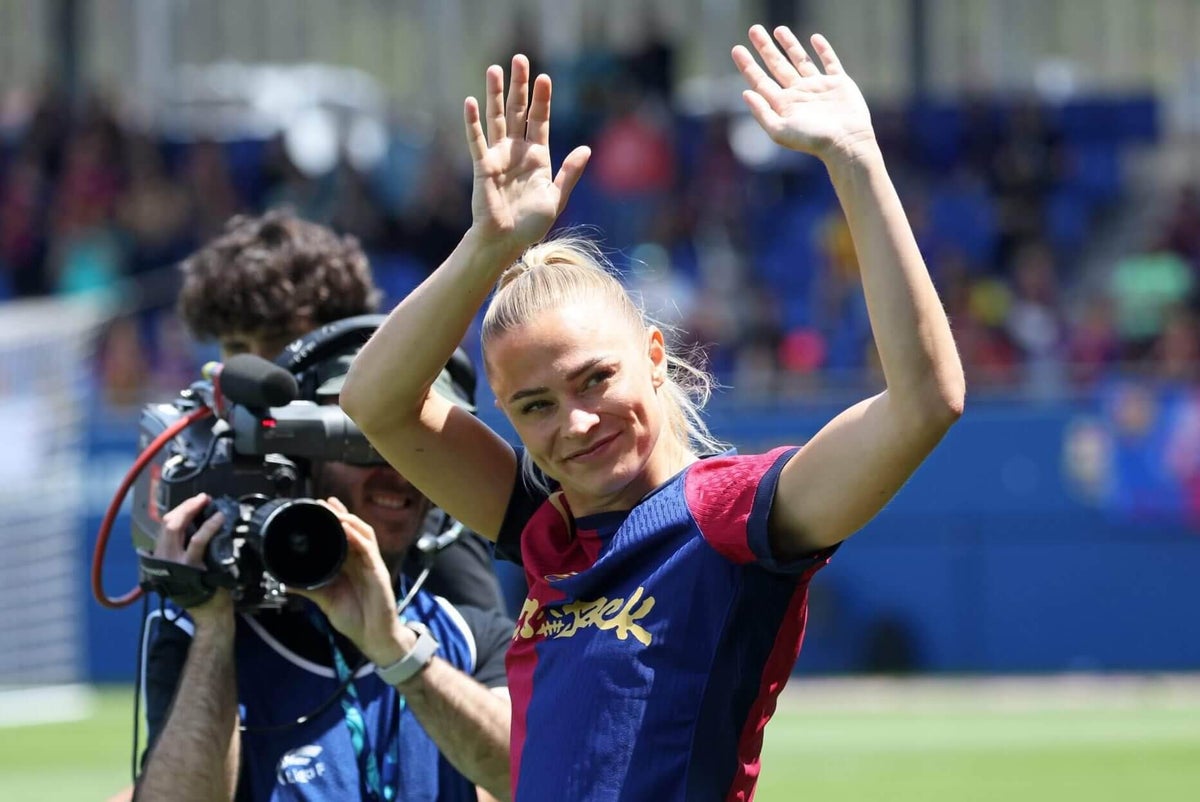“Where do I start?” was how Fridolina Rolfo opened her farewell letter to Barcelona after the club reached an agreement with her to terminate her deal early.
The Sweden international’s exit was a shock to everyone, including her Barca team-mates at the European Championship with Spain, who only found out after their 6-2 win against Belgium.
“I walked into the dressing room and they told me,” centre-back Irene Paredes said in the mixed zone after that match. “I don’t have any more news, I haven’t been able to talk to her. I’m sad because she’s been a very important player. I want to talk to her and if it’s the best thing for her, we have to respect it.”
“I don’t know much, but all I can do is thank her for all the years she’s been with us,” Alexia Putellas said in her post-match news conference. “I wish her the best of luck on a personal level because she’s been a great team-mate.”
Rolfo joined Barca on a free transfer from Wolfsburg in 2021, signing for a team that had just won their first Champions League title. She signed an initial deal until 2023 and then extended it until 2026 two years ago.
A year earlier, she had been the villain who eliminated the Catalans from the Champions League semi-finals while playing for Wolfsburg, but the fans were quick to forgive her, especially when she scored the goal that gave them a second Champions League title with a 3-2 comeback win against her former team.
Signed as a left-winger, she alternated between there and left-back for Barca, eventually settling in the latter position. She enjoyed huge success, lifting two Champions Leagues, four Liga F titles, three Copas de la Reina and four Supercopas de Espana. She played 131 times for the team, scoring 40 goals.
She became a much-loved figure in the dressing room and formed a close friendship with Norway international Ingrid Engen — who moved to OL Lyonnes this summer — and with reigning two-time Ballon d’Or winner Aitana Bonmati. But not even Bonmati was aware of the 31-year-old’s plans.
Rolfo is close with Bonmati (Maja Hitij – FIFA/FIFA via Getty Images)
Hours before the Rolfo announcement, Barca also announced that goalkeeper Ellie Roebuck’s contract had been terminated. She had signed for them only last year, arriving on a free transfer from Manchester City with a contract until 2026.
But the goalkeeper played just twice for Barca and her departure was not a surprise. Roebuck made her debut for the club in December after 19 months without playing following a stroke in the occipital lobe of her brain. She was in the final stages of her medical recovery when she joined.
Her limited playing time — just 180 minutes — and the club’s clear commitment to Spain’s Cata Coll as No 1 meant she was open to leaving in search of greater opportunities. She agreed to terminate her contract early to join Aston Villa on a two-year deal.
Rolfo’s exit made the headlines in Barcelona — so what was the explanation? As so often across the club, it comes down to their delicate financial situation.
For several summers, Barca have been struggling to operate normally in the transfer market due to historic debts of €1billion (£863m; $1.2bn). Because Barca have been spending more than they have been allowed to on wages (they have been breaking La Liga’s salary limit, which is calculated for each club according to their income), the competition body has restricted their registration of new signings.
The salaries of Barca’s women’s team players — as well as those of all other sporting departments at the club — count towards La Liga’s limit. Barca’s basketball team, for example, have been limited in their signings as the club look to improve the men’s football section’s financial fair play situation.
According to Barcelona sources who, like all those cited in this article, asked to remain anonymous to protect relationships, Rolfo’s contract termination was out of financial necessity rather than a sporting decision or anything to do with the club’s coaching staff.
Rolfo lost prominence last season (Ion Alcoba Beitia/Getty Images)
Rolfo’s salary will have been significantly lower than that of the men’s first-team players. For 2024-25, Barcelona budgeted €319m ($373m; £275m) on salaries for the men’s team, compared with €11m on the women’s side. The grassroots football department was allocated €17m.
But Rolfo has also lost prominence since the arrival of the Netherlands’ Esmee Brugts in 2023.
Rolfo played in that year’s Champions League final and the World Cup in Australia and New Zealand that summer despite suffering from knee pain. She finally underwent surgery on the meniscus on her right knee in early September 2023, shortly after returning from the World Cup, and spent the next six months recovering.
Brugts arrived that summer while Rolfo was still out and settled into the team. The pair competed for the left-back spot last season, but Rolfo has not been helped by further injury problems. In November, she suffered tendinopathy — swelling of a tendon — in her left hamstring, then twisted her left ankle during a Nations League match against Denmark a month ago. That injury caused her to miss the Copa de la Reina final against Atletico Madrid.
While she had a year left on her deal, the player was not strongly opposed to the club’s proposal. Both parties reached an agreement that suited them, according to sources close to the player and the club.
So Rolfo leaves Barcelona having turned from villain to heroine and in search of new adventures, but her exit is just another sign of how the club’s financial situation has an effect at all levels.
(Top photo: Joan Valls/Urbanandsport/NurPhoto via Getty Images)
